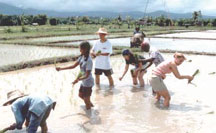|

Teens
Share Summer Adventures
By
Rachel Mittelman
During
her dream vacation, 16-year-old New Yorker Necoe Simpson noticed
policemen pulling license plates off of illegally parked cars.
Despite that bit of culture shock,
she found Mexico more like home than she had expected. Officials
at the YMCA Global Teens Program (GT), who sent Simpson and 49
other teenagers to Mexico, Venezuela, Korea, Ireland or Thailand
this summer under the supervision of two adult group leaders per
country, were not surprised.
Sharon Pollack, an associate executive director for International
YMCA that initiated Global Teens in 1995, remarked, “For many
kids in New York, racial and ethnic differences loom large and
there are great divisions between young people.” Then GT places
10 15- to 18-year-olds in a completely unfamiliar environment.
“After about 30 minutes, they realize how similar they are.” Discovering
the flimsiness of ethnic boundaries, the teenagers in a group
draw close to each other and to the 10 teens from the host country
who share their three-week stay.
“Surprisingly,
the teens manage to communicate with each other,” said Christina
DeFreitas, teen director at International YMCA,
discussing language barriers. The American travelers only have
to learn a few basic
words of the foreign tongue and the host teens generally do not
know much English, but
they rapidly find common ground. By the
end of her trip, Simpson affirmed, the
Mexicans’ English had improved along
with the Americans’ Spanish. According
to DeFreitas, many teens return to NY determined to master their
new language.
Aside from friendly interaction with foreign teens, GT has a specific
structure reflecting the program’s triple focus. The Americans
spend about a week sight-seeing; visits to museums, amusement
parks and political buildings like the home of Mexico’s President
bolster preliminary meetings in which the teens learn some basic
facts about the history, current events, monetary issues and weather
of the country they will visit. At these country orientations,
they discuss the concept of culture and imagine themselves as
ambassadors.
The second focus of the program is community service, typically
a major component of YMCA activities. Simpson helped run a
summer camp for kids in poor communities, whereas other groups
have worked on environmental or building projects. This year teens
could be found digging a pond in Ireland or cooking for and serving
the elderly in Korea.
The final component of the program, which most teens consider
the best part, is a
weeklong home-stay. People affiliated with YMCA in the host country
invite American teenagers to share their daily experience, immersing
them in the culture. Simpson especially enjoyed her conversations
about America with the woman who housed her. Seeing New York through
the eyes of a Mexican woman who dreamed of Central Park gave Simpson
a new perspective on her own background. “It made me appreciate
my country more,” she explained.
A back-home commitment keeps all GT teens connected to the program.
At presentations to YMCA board meetings, school and community
groups, they share their personal experiences with the larger
community. Kids remaining in NYC help plan future events and raise
funds for scholarships, while kids away at college can maintain
alumni lists,
contribute to newsletters or participate in outreach. GT is a
lasting experience. “It has influenced career choices in the past,”
said
DeFreitas.
Pollack summed up the philosophy behind GT: “It’s very important
for young people
to get a sense of the world outside their local communities, and
through working with their peers they begin to think of themselves
as global citizens who can impact global
programs.”
Education Update, Inc., P.O. Box 20005, New York, NY 10001. Tel:
(212) 481-5519. Fax: (212) 481-3919. Email: ednews1@aol.com.
All material is copyrighted and may not be printed without express consent of
the publisher. © 2001.
|

